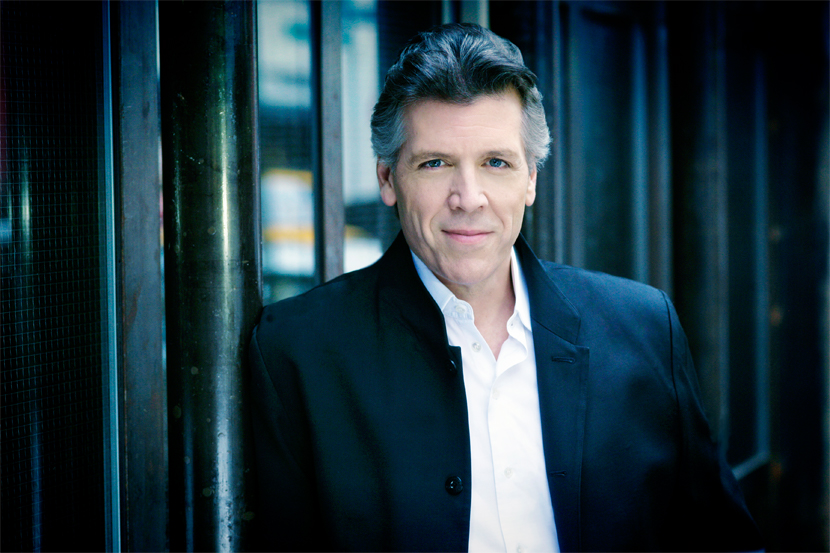“Thomas Hampson, Spokane Symphony shine”

“Hampson’s voice is a truly incredible instrument, and it’s hard to imagine anyone walked away from the Fox Theater on Sunday afternoon disappointed.
Anyone who knows me knows that my knowledge of classical music and opera is pretty much limited to what I’ve heard in Looney Tunes cartoons and on movie soundtracks (seriously, Bugs Bunny’s spin on The Barber of Seville in Rabbit of Seville is a classic!). Part of Hampson’s skill is appealing to everyone from the expert to the novice, with an ingratiating performance style that’s as fun to watch as it is to hear.
For the experienced classical and opera fan, hearing Hampson tackle a program split between the likes of Mozart, Wagner, Verdi and Puccini and American composers like Leonard Bernstein, Aaron Copland and Cole Porter had to be a thrill. As a non-expert, I was easily drawn in to his takes on “Hai gia vinta la causa” from Mozart’s The Marriage of Figaro and Hampson seeming to be swept away by the emotion of “O du, mein holder Abendstern” from Wagner’s Tannhäuser. And the sheer power of Hampson, the choir and the symphony joined together on the first set’s closing “Va, Tosca” was truly remarkable.
Hampson’s winning stage persona came through even more in the second half of the program, as conductor Eckart Preu led the ranks on stage through vibrant, energetic American classics. The mini-suite of Copland’s “The Dodger,” “Simple Gifts” and “The Boatman’s Dance” was lovely, and Porter’s “Begin The Beguine” brought some subtle dance moves from the headliner and one of several standing ovations from the audience — leading to an encore performance of Porter’s “Night and Day.”
While Hampson’s career has taken him far from Spokane, to the opera houses and recital halls of Europe, he was one of the community members who worked so hard to raise money and awareness for the Fox’s rebirth a decade ago. He sang the praises of the venue Sunday during a show that, in addition to showcasing a favored son of Spokane, illustrated what treasures we have access to all the time in the Spokane Symphony and its singers.
“I hope you all know how to be proud of this hall and its orchestra,” Hampson said Sunday. Programs like this weekend’s make that easy.”
Dan Nailen – Inlander
“The first half of the program could serve as a synopsis of the course of opera from W.A. Mozart through Richard Wagner and Giuseppe Verdi, to Giacomo Puccini. It was skillfully designed by Preu to showcase equally the abilities of Hampson, the orchestra, the choir, and, not least, the hall, which is a wonder both visually and acoustically. Overtures to two operas by Mozart, “Cosi Fan Tutte” and “The Marriage of Figaro” were paired with arias composed for those operas. Juxtaposing the two arias revealed one of Thomas Hampson’s most remarkable qualities: his ability to act with the voice, imparting a color, a tone, an accent capable of projecting the inner essence of a character. The naively eager Guglielmo in the aria from “Cosi” could easily be distinguished from the pompous, blustery Almaviva of “Figaro” even by one who knew neither opera and listened with eyes closed.
This gift of Hampson’s was even more apparent is the “Song to the Evening Star,” from Wagner’s “Tannhaüser,’ and the “Te Deum” from Puccini’s “Tosca.” Hampson’s vocal type is described as a lyric baritone, and the lyricism that sweetened his voice as he softly intoned the beginning of the Wagner aria was pure magic. In the Puccini segment, however, the sweetness was gone, replaced by the leering snarl of the loathsome Baron Scarpia. This was a master class itself in the art of vocal characterization. It was continued in the second half of the program, which highlighted Hampson’s heroically successful championing of American music in selections from Aaron Copland’s “Old American Songs” and two supreme examples of the art of Cole Porter: “Begin the Beguine” (1935) and, as an encore, “Night and Day” (1932).
One suspects that Hampson dislikes being described as a “crossover” singer, as he sometimes is. To cross over something, there must first be a barrier to be crossed. Hampson’s career has demonstrated that many divisions in music are false, and that, to quote Duke Ellington, “If it sounds good, it is good.”
Larry Lapidus – The Spokesman Review